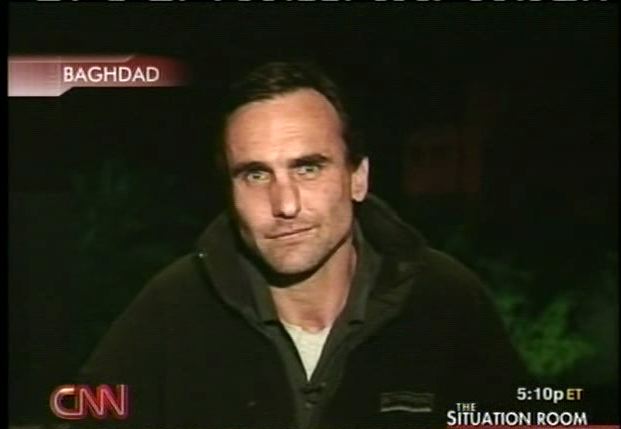TSR: "Tehran will be looking to press its advantage."

Click photo to play
Length: 5:06
WOLF BLITZER: In Iraq, it's another day of bombings and dead bodies turning up in the streets.
Meanwhile, Iran has its own view of what's behind the violence next door.
And joining us now, our correspondent in Baghdad, Michael Ware -- Michael, as you know, the president of Iraq, Jalal Talabani, has been meeting with the Iranian leadership, including the supreme ayatollah today, who accuses the United States of fomenting all the sectarian strife in Iraq.
What's going on right now in terms of Iran's influence in Iraq?
MICHAEL WARE, CNN CORRESPONDENT: Well, Wolf, many would argue that, in fact, it's Tehran that has much more influence over this government than Washington does. Indeed, some would argue that beyond the prime minister's office and the office of the national security adviser, this government isn't much more than just an alignment of militias that, in one way or another, have a connection to Tehran.
So, you can see that the Iranian influence here really is quite strong. And in many ways, we can't expect a lot to be delivered from these meetings in terms of U.S. interests. I mean what Tehran will be looking for from the U.S. is that it won't take its foot off the accelerator until the U.S. gives it some of the things that it wants.
Tehran in Iraq has the U.S., has Washington caught essentially in a vise between al Qaeda and the Sunnis on one side, and America's Sunni Arab allies in the region like Jordan, Egypt and Saudi Arabia, and Iran's own regional aspirations on the other.
So this is really quite a development for Iran and U.S. policy in the Middle East.
BLITZER: Because, as you know, many American analysts have feared that the Iranians are trying to create this Shiite-led access from Iran through Iraq through Syria to the Hezbollah, the Shiites in Lebanon, as well. And this is very alarming to the Sunni Arabs in Saudi Arabia and Jordan, in Egypt and elsewhere.
Is this concern realistic based on what you see?
WARE: Well, it's certainly true that U.S. military intelligence believes, and as General Abizaid this week has said, that hard-line elements, particularly of the Iranian Revolutionary Guards Quds Force, or its equivalent of the Green Berets, are still entrenched in their policy of exporting the Islamic revolution of the mold that Tehran has set. And that continues.
We see their influence in southern Lebanon with Hezbollah. And they're claiming victory there with a key American ally, the Israeli Defense Forces, seem to have been defeated.
So, literally their tails are up. Here in Iraq, during a period of American strategic uncertainty, with the resignation of Secretary Rumsfeld, the upheaval of the mid-term election, it's evident that Tehran will be looking to press its advantage.
So, yes, this is a time for Tehran to be looking to make the most of its gains.
BLITZER: Is there any realistic chance that the prime minister, Nouri Al-Maliki, is going to clamp down on Muqtada al-Sadr and his militia?
WARE: Oh, no chance whatsoever. I mean, like we're saying, I mean, what is the reality of the government of Nouri al-Maliki?
It's little more than an apparition. And Nouri al-Maliki relies upon his position from Muqtada himself. So he can't blow back on that, even in the face of American pressure.
BLITZER: So, what is the next step? What happens next, as far as you can tell?
WARE: Well, there's many roads that could be taken from this point on, Wolf, and none of them are terribly attractive. We'll see what comes out of this week's meeting in Jordan between the prime minister of Iraq and President Bush. We'll see what shakes out of the tree following President Talabani's visit to Iran. We'll see what comes of the Baker-Hamilton Commission.
But honestly, there's so many options right now and, Wolf, none of them are attractive at all.
BLITZER: Michael Ware is our reporter in Baghdad.
Michael, thanks.
WARE: Thank you, Wolf.
BLITZER: Let's go to New York.
Jack Cafferty has "The Cafferty File" -- Jack.
JACK CAFFERTY, CNN CORRESPONDENT: The more I see him, the better I like him. Boy, he's good.
BLITZER: And, you know, he's a courageous guy. I can't help but stress, three-and-a-half years he's been on the front lines covering this war. That takes a lot of guts.
CAFFERTY: And speaking from, you know, from the gut and from the heart and spitting back facts to the questions, not political posturing or position papers. It's, "I'm here and this is what's going on," and, boy, is that refreshing.
CAFFERTY: If Michael Ware runs for president, I'll vote for him.
BLITZER: He's originally from Australia, so I suspect he can't.
CAFFERTY: Change the law.
BLITZER: OK, Jack.
